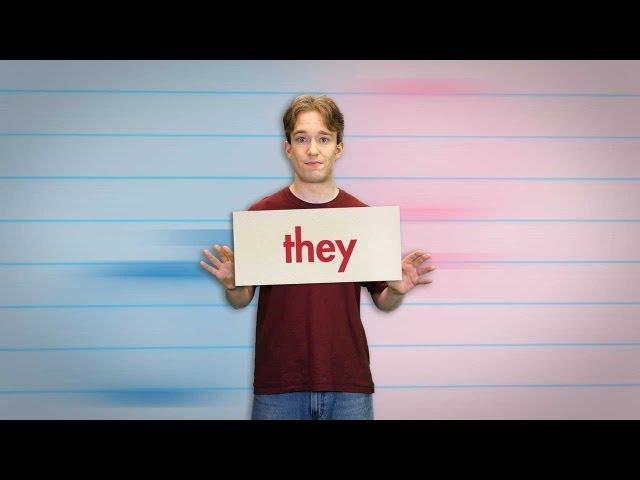
Gender Neutral Pronouns: They're Here, Get Used To Them
CORRECTIONS
March 9th, 2019
Back in 2013, I made a video about ‘singular they’ and gender-neutral pronouns. Looking back on it with half a decade of hindsight, there are several things I want to correct. I also have a few thoughts on how the reactions to it have changed over time, and why the video’s comments will remain off.
Firstly, while editing the video, I cut the first sentence of the script. That sentence didn’t seem to add anything, and I’m a believer in ‘don’t bore us, get to the chorus’. That would have been fine — if only the script didn’t refer back to that first sentence later on, noting that the viewer probably didn’t notice the singular they in it.
There used to be an annotation explaining that mistake, but YouTube’s deleted all annotations now. I regret the error.
Secondly, I mentioned that recently-coined gender-neutral prounouns (hir, xe, etc) haven’t caught on in regular usage, and that trying to deliberately add new words into a language is extremely difficult. I think that’s true, but my tone was a bit too dismissive — there was an implied value judgment there. I’d rephrase that in a second video.
And finally, I co-opted a couple of LGBT slogans, both in the title of the video and the video itself. Those aren’t my slogans to rewrite, and adding ‘with apologies to’ in the reference line isn’t a great way of solving that. Looking back, I’m uncomfortable with those.
Changing times
In 2013, the video was uncontroversial. You can see that in this chart of likes and dislikes over time from YouTube’s analytics tool:
[graph available on https://www.tomscott.com/gender-neutral-pronouns/ ]
The video received very few dislikes until 2016. And I remember the comments from back then: those dislikes weren’t from angry conservative types. Instead, those were speakers of languages that used grammatical gender — they were angry that I’d insulted their language!
But you can see the tide start to shift in 2016. This is why I turned off comments: it seems that a small number of people with limited empathy deliberately search out videos about subjects like this just so they can hit ‘dislike’, leave awful comments that are usually one of a few toxic in-jokes, and go. YouTube's moderation tools remain desperately inadequate at dealing with that problem without appointing full-time moderators, and frankly, that would be time and money that could be better spent on almost anything else. For that reason, the comments are going to remain off.
If I were to remake this video in 2019, the most significant change would be focus: the title would be all about singular they, not gender-neutral pronouns. It probably wouldn’t even mention LGBT issues beyond a quick reference. It wouldn’t be a shout of hey, did you know about these folks, because five years later, most people watching the video do. Instead, it’d be a quiet nod of I see you.
What worked for a 2013 audience doesn’t work in 2019.
It seems that, over the last few years, non-binary and trans folks have reached stage three on the Williams Scale: ‘then they fight you’. Hopefully, it won't take long to reach stage four: ‘then you win’.
Тэги:
#tom_scott #tomscott #linguistics #language #gender #semantics #Pronominal_Gender #gender_neutral_pronounsКомментарии:

This comment section was reasonable a few years ago when I put this video up, but now it seems like there's a lot more kneejerk-reaction boors who comment without watching the video. Everything's already been said and I'm sick of banning jerks, so I'm closing these comments. (And yes, I accidentally trimmed the "very first sentence" that I refer to while I was editing. I regret the error!)
Ответить
Funny and sad at the same time that years later people are still arguing about if those some people (the ones that are they) exist. I ran into this through recommend videos, thought about people I run into who would be all offended over the concept, and then read a few comments and was basically like "Oh. Of course they've been here being clueless and hateful. Why wouldn't they?"
Ответить
I agree he or she was always bad, but they/their is plural usually. Grammatically speaking, a formal rule change is needed somewhere.
Ответить
"Some people are 'they'
Get over it"
Brilliant

Some people are "they", get over it. XD Oh thank you I needed that laugh, you don't understand how brilliant that is
Ответить
A lot of times when someone doesnt really know if a person is female or male 'they' say 'they' this isnt a new thing at all but people are acting like it is.
Ответить
ENGLISH IS SUCH A SEXIST, RASCIST, TRANSPHOBIC, HOMOPHOBIC, LANGUAGE! DOWN WITH PRONOUNS!
Haha, just kidding.

"there are folks who don't want to be identified as either he or she and if that surprises you, you need to get out more." I LOVE YOU AND THIS VIDEO
Ответить
Yes! Thank you! Something I have argued for a long time.
Ответить
I had a heart attack when the bus came through
Ответить
This video says a lot and it's really important to spare this message
Ответить
I love this guy for this video. i could honestly cry rn
Ответить
Sorry to stonewall? dude I'd be surprised if they didn't use this as a resource!
Ответить
So much <3!
Ответить
The English speaking countries have it easier, they don't have grammatical genders like Italians, French, Spanish, etc etc etc. I can't think of a neutral gender in my own language, because we don't have one. However, when it comes to objects, we don't really mean a bottle is a girl or the sun is male, it's just how romance languages evolved.
Ответить
I enjoyed the video except of course the part where you insult entire nations by calling a part of their language "such a stupid concept". I don't recall people in my country having a vote on how their language is going to work.
Ответить
In Norwegian, most words that are primarily "female" words (ending in -a (-er) (-ene) you can chose do make the word "male" (which is still grammatically correct and change the ending of -a to -en, and since male words also end in -er and -ene you can change the words gender (in MOST cases). You cannot, however, change the gender-neutral words to a gendered word. So any word ending in -et stays neutral and you can't do anything.
But then you have the other Norwegian (Yes, there are two separate Norwegian languages, and most people don't speak the other one that well, due to the fact that they are VERY different), where the words gender is final, and you can't change it. And words in this Norwegian often have a different gender than in the other Norwegian. So a lot of times a word that is male in "bokmål" (one type of Norwegian) is more often than not female in "Nynorsk" (the other type of Norwegian).

I'm glad finnish language doesn't have any of these or articles.
"Hän" is for everyone.
Though we use "se" more often which basically means "it" but it sounds more natural than "hän" :D
Minne se meni? (Where did it go?)
Se meni kauppaan. (It went to the store.)

Just use "that person" since it's 3rd person
And using they is weird cause they is plural
Maybe bring back an old word like thou, that would be really cool

It's fine with me but I always slip up because I'm not used to calling people 'they', guess I'll just get used to it.
Ответить
We like They and We as singulars...
Ответить
de, het en een.
Ответить
I love the fake sources. I also didn't know the blond(e) thing but that explains so much.
Ответить
isnt they plural?
Ответить
"She" in german is "Sie". The formal version of "you" is also "Sie". And "They" is also "sie". I think we got a problem.
Ответить
i know you're a descriptivist but technically isn't it "masculine" and "feminine" not "male" and "female"? correct me if i'm wrong, and it certainly doesn't detract from the rest of the video, which is, i must stress, fantastic
Ответить
Is calling someone "they" a relatively recent thing? I've never heard someone use "it" to describe male or female or other in all my life. Odd.
Ответить
i wish there were genderless pronouns in spanish :(
Ответить
The linguistic mafia will run you over a bus if you break your oath of descriptivism, eh? Seems like they're trying to enforce aspects of language.
Ответить
Love this, I was expecting that you would be talk about all of the fake ones, such as anything comprised of the letter x or y. You made a great point, with well reasoned arguments and without expecting the entire world to automatically add 124 pronouns for 'beings' preferring to be referred to as organisms and the like. You've managed to fit yourself in to a very sensitive topic without offending either well informed party. Love your work mate
Ответить
In Filipino we don't have grammatical genders, not even he or she. We also have a difference between 'we' as in both speaker and listener (tayo) and 'we' as in the speaker and others not in the conversation (kami). But there's also the complicated grammar; 'laro' (play) can also be naglaro, naglalaro, maglalaro, maglaro, panglaro, laruan, laru-laro, naglalaro-laro, maglalaro-laro, maglaro-laro, paglaro, paglalaro, etc.
Ответить
bolditaliccrossout

I'm sure this comment section will go over well.
Ответить
Yey I finally understand why all the monsters said "they" in Undertale :D
Ответить
dress in spanish vestido = masculine shirt = camisa feminine
Ответить
i love how she/he/him show how old english used to have grammatical Ginger and na accusative case. you can really tell how a language was just by how it is
Ответить
Are you saying that there are more then 2 sexes?
Ответить
never expected this sort of video from you tom.
Ответить
YES THANK YOU
Ответить
Mandarin is interesting here: 他(ta1): He, 她(ta1): She, 它(ta1): It. Same word in spoken language but distinguished when written.
Ответить
A lot of things about language are clunky and weird. Language evolves through a messy process of evolution, not elegant design. Get used to it.
Ответить
this is the best video on the Internet
Ответить
It must be nice to have a language so simple you can basically do whatever you want with it and it still sounds okay-ish.
Ответить
You forgot that in French, they have the word "they" but using that would be pointless as it is also classed into male in female. "Elles" is used when talking about a group of females while "Ils" is a group of males OR a group of males and females, which is even more sexist
Ответить
I don't hey why people don't like being called "they". I'm 100% biologically male and completely identify as such, and I don't even notice when some refers to me as "they".
Ответить
"They", under 99% of circumstances, is used to refer to a 3rd party that isn't present or in attendance. Saying "they" to refer to the viewer, for example, would be confusing.
Ответить
I use they/them pronouns so I quite like this video :)
Ответить






![[New Feature] Ecomhunt Tracker - How To Use It To Find Winning Products! [New Feature] Ecomhunt Tracker - How To Use It To Find Winning Products!](https://invideo.cc/img/upload/QWZWeTdFdTlqdVI.jpg)

![[Arknights CN] CE-5 2 Sniper - Archetto's skin S3 showcase [Arknights CN] CE-5 2 Sniper - Archetto's skin S3 showcase](https://invideo.cc/img/upload/NFgwUE0tdHFSamI.jpg)
















